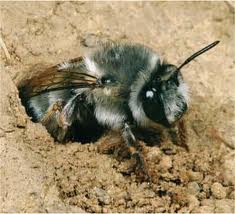Ground Nesting Bees
go.ncsu.edu/readext?597286
en Español / em Português
El inglés es el idioma de control de esta página. En la medida en que haya algún conflicto entre la traducción al inglés y la traducción, el inglés prevalece.
Al hacer clic en el enlace de traducción se activa un servicio de traducción gratuito para convertir la página al español. Al igual que con cualquier traducción por Internet, la conversión no es sensible al contexto y puede que no traduzca el texto en su significado original. NC State Extension no garantiza la exactitud del texto traducido. Por favor, tenga en cuenta que algunas aplicaciones y/o servicios pueden no funcionar como se espera cuando se traducen.
Português
Inglês é o idioma de controle desta página. Na medida que haja algum conflito entre o texto original em Inglês e a tradução, o Inglês prevalece.
Ao clicar no link de tradução, um serviço gratuito de tradução será ativado para converter a página para o Português. Como em qualquer tradução pela internet, a conversão não é sensivel ao contexto e pode não ocorrer a tradução para o significado orginal. O serviço de Extensão da Carolina do Norte (NC State Extension) não garante a exatidão do texto traduzido. Por favor, observe que algumas funções ou serviços podem não funcionar como esperado após a tradução.
English
English is the controlling language of this page. To the extent there is any conflict between the English text and the translation, English controls.
Clicking on the translation link activates a free translation service to convert the page to Spanish. As with any Internet translation, the conversion is not context-sensitive and may not translate the text to its original meaning. NC State Extension does not guarantee the accuracy of the translated text. Please note that some applications and/or services may not function as expected when translated.
Collapse ▲
Around this time each year, we begin to receive questions at the N.C. Cooperative Extension of Union County office and via the Extension Master Gardener℠ Volunteers of Union County Growline about bees nesting in the ground and leaving mounds of soil on the soil surface. Often times, if folks have never seen these before they are worried about being stung by the bees or they see the soil mounds and may think it is fire ants.
Not to worry, though. Generally, they do not sting. These little guys are solitary bees and are not colony forming bees like the honey bee and they don’t build a single nest that builds up large numbers by the end of the season like yellow jackets or hornets.
A single female bee builds the nest by burrowing into the ground. She prepares larval cells where eggs will be laid. Mothers provision each brood cell with a mixture of pollen and nectar called bee bread that serves as food for young larvae. After laying an egg she closes the brood cell and starts another. After completing several brood cells, the mother will seal the entrance and leave the nest to begin a new nest. After a few weeks, she will die leaving the next generation safe in the ground. In spring the bees complete development and emerge as adults that dig their way out of the ground and forage for pollen and nectar to provision their own nests. The visual spectacle of these bees is produced largely by males who swarm over nests trying to mate with newly emerged females.
Hundreds of small mounds and swarms of bees often trigger calls to exterminators or landscape professionals. Homeowners fear that they will be attacked and stung as they bend over to pick up the paper and they believe that the bees are actively damaging their yard and want them gone. This is not the case.
These bees prefer to nest in dry, sparsely vegetating areas. Therefore, if you have bees nesting in your lawn it is because the grass is thin and soil dry. The bees don’t make it this way they just take advantage of the conditions. If anything, the bees are providing a valuable service by providing pollination services & aerating the lawn! Because you now understand their habitat preferences, you can take steps to discourage nesting and reduce numbers for next year. You can irrigate during the times the bees emerge & nest and you can take steps to improve your lawn to create a thick stand of grass to encourage the bees to make their nests elsewhere. Native bees are an important part of ecosystems and food production. We should take steps to protect these bees or at least use non-lethal means to encourage them to nest somewhere else.
Join the Master Gardener℠ volunteers of Union County for a Walk & Talk in the Teaching Garden, Thursday, April 18, 2019, at 6 p.m. at the Union County Agriculture Center. The group will meet at the greenhouse. You may even see some bees and other pollinators.




